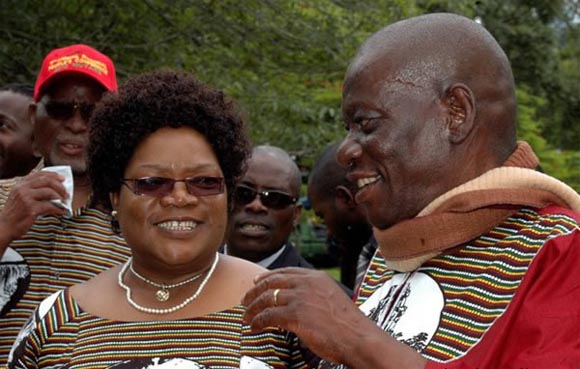PBS: Escaping Eritrea … [Read More...] about ካብ ውሽጢ ቤት ማእሰርታት ኤርትራ
I’m sorry – Mujuru
Gift Phiri, News Editor • 2 JUNE 2015 • Daily News (Zimbabwe)
HARARE – Former Vice President Joice Mujuru apologised to Zimbabweans last night for mistakes she and her erstwhile Zanu PF colleagues made in office and said she takes full responsibility for failing in their mandate to the nation. Mujuru, long considered a likely successor to President Robert Mugabe, poured her heart out in a damning statement that described the ruling Zanu PF as a “paranoid and insular organisation”.
Mujuru was expelled for allegedly plotting against the nonagenarian, after First Lady Grace accused her of being incompetent and leaving her husband to do most of the work. The widow of Solomon Mujuru, Zimbabwe’s first black army general after independence whose charred remains were found after a mysterious house fire at his Beatrice Farm in 2011, was expelled by the ruling party after being accused of “corruption, fanning factionalism and treason”.

Mugabe’s wife also accused Mujuru of plotting to assassinate the president, who turned 91 in February. But her ouster was widely seen as a bid to stymie the former VP’s challenge to President Mugabe. A former guerrilla fighter from the liberation war in the former Rhodesia, Mujuru said six months after the accusations were first made, no charges have been filed against her either at party or State level.
There were widespread fears that she would risk being arrested when the allegations were first made. She has staunchly denied the graft and high treason accusations. Mujuru yesterday said she realised the ruling party’s popularity had plummeted because of some wrong decisions they had made. She said her eventual expulsion from Zanu PF was inevitable “as my vision for Zimbabwe was divergent from that of the rest of the party leadership.”
“ We collectively failed in our basic mandate to the people,” she said. “Zanu PF was once a party that was internally corrective and externally united, but has now descended into a paranoid and insular organisation,” Mujuru’s statement said. “I have resolved that I will not join the finger-wagging class, who apportion blame but refuse to take responsibility.” Mujuru acknowledged Zimbabwe was in danger and that as a patriotic Zimbabwean and “mwana wevhu (child of the soil)”, it was imperative to save it.
She dismissed all accusations against her as politically motivated. “I served faithfully in the government of Zimbabwe from then until my controversial , non-procedural and unjustified expulsion from both party and government in December, 2014,” she said. “To be discarded by my own party was initially devastating. I experienced feelings of betrayal and broken trust. However, as many know, it is when we confront our greatest fear that we find personal redemption.”
The ruling Zanu PF has faced political instability, a wave of expulsions of all her key allies, a move that analysts say was meant to neutralise her as a threat. The government, led by Mugabe, has struggled to cope with the multiple challenges.
Political analysts, however, say Mujuru — whose support for Mugabe was also deeply unpopular — would have a relatively easy struggle to make headway to the presidency, and is shrugging off increasing calls for her to enter the fray and challenge Mugabe. She said: “Many of you will either criticise me or disagree with my approach ,but I am a product of my culture, a culture I am very proud of , and the platform to challenge those older than me (and who indeed were like a father to me) is not in public,” she said.
Jenai Cox, Freedom House’s programme manager for Africa, has warned that Mugabe’s decision to dismiss Mujuru, seen to be a force for moderation, risked sparking instability in the party and country. Mujuru said the whole experience of her expulsion “humbled me” and despite the trauma, “I have rediscovered myself.” “I have played with and cooked for my grandchildren, worked in the fields, and faced the day to day challenges of any ordinary citizen of Zimbabwe without the privilege of high office,” she said.
“My true friends and comrades have stood beside me and I have had unusual insight into the fickle nature of man, who prefer to pursue opportunity only for personal gain. I have been encouraged to defend myself, in response to the baseless, cruel and destructive criticism that I have endured. “However, I cannot and will not do this. Ndiri mwana wevhu, (I’m a child of the soil) I remain loyal to my culture and the ideals of the armed struggle.”
Invoking the spirit of her late husband, Mujuru regretted failing to fight poverty and make the country a fairer place for all its people. “For my own role in this failure, I am truly sorry and I apologise to my fellow Zimbabweans,” Mujuru said. “This humbling experience has afforded me the opportunity to reflect on the higher ideals of the armed struggle and with sadness, I have had to digest the many shortcomings in delivery. It is a time in our history of contrition and reflection, for cleansing and for divinity of faith.”
Analysts say her chances of significantly changing the political course of Zimbabwe will depend on the amount of work that she puts in, the extent to which she organises, the timing of her availability to contest and her ability to convince those in the ruling party and those in opposition that she occupies the middle ground where the majority of the country is on issues, according to Crisis in Zimbabwe Coalition boss McDonald Lewanika.
